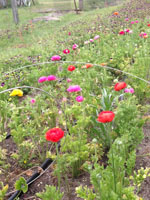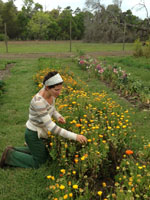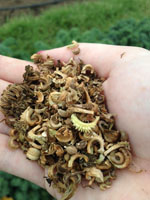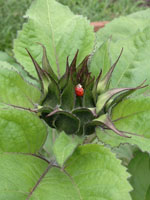WEC Alumni in the World - Anna Prizzia and Melissa DeSa - Forage
 Anna Prizzia (WEC M.S. 2013) had long been involved with sustainable and local food systems when she and her business partner, Melissa DeSa (SNRE M.S. 2008), founded Forage in 2012. The mission of Forage, a farm and education center, is to inspire people to value healthy food, land and community by supporting the local food system. “Food touches every aspect when you talk about sustainability,” Anna explains. “The protection of natural resources, land and native species are all linked to food, and if produced responsibly, the health of both humans and the environment benefit.”
Anna Prizzia (WEC M.S. 2013) had long been involved with sustainable and local food systems when she and her business partner, Melissa DeSa (SNRE M.S. 2008), founded Forage in 2012. The mission of Forage, a farm and education center, is to inspire people to value healthy food, land and community by supporting the local food system. “Food touches every aspect when you talk about sustainability,” Anna explains. “The protection of natural resources, land and native species are all linked to food, and if produced responsibly, the health of both humans and the environment benefit.”
When Anna and Melissa decided what to grow at Forage’s farm, they surprised people. Instead of growing vegetables, they decided to grow flowers, which they consider “food for the soul.” This way, they figured, they would not compete with local vegetable farmers, and the flowers would support Florida’s many native pollinators. The beauty of the flower farm also provides an ideal outdoor venue for community workshops as well as a sustainable source for weddings and event flowers. Forage caters these events seasonally.
 Forage offers classes and workshops for adults, after-school programs for kids in Alachua County schools, family events, and even a seed library. The objective of the seed library is educate and engage the public to save the resource most valuable to our existence as humans: the seeds we rely on for food. Home gardeners and farmers alike and can participate in the process by learning the basic techniques and have a place to share their excess seeds with the community. While the library is still developing, the idea is that members can “borrow” and plant the seeds, then return the same seeds during the next growing season. This process will start to cultivate crops that are adapted to Florida’s challenging environment, providing varieties that not only perform well, but demand fewer natural resources to produce food. Forage is always looking for volunteers to help out with each of the different aspects of the business.
Forage offers classes and workshops for adults, after-school programs for kids in Alachua County schools, family events, and even a seed library. The objective of the seed library is educate and engage the public to save the resource most valuable to our existence as humans: the seeds we rely on for food. Home gardeners and farmers alike and can participate in the process by learning the basic techniques and have a place to share their excess seeds with the community. While the library is still developing, the idea is that members can “borrow” and plant the seeds, then return the same seeds during the next growing season. This process will start to cultivate crops that are adapted to Florida’s challenging environment, providing varieties that not only perform well, but demand fewer natural resources to produce food. Forage is always looking for volunteers to help out with each of the different aspects of the business.
During her graduate study, Melissa DeSa spent most of her time doing wetlands work while studying herpetofauna under the advisement of Dr. Wiley Kitchens. By the time she graduated with a degree in Interdisciplinary Ecology, she had begun to take an interest in agriculture and conservation education. “I didn’t want to be in academia anymore, and realized I couldn’t always be a field tech,” she says. However, Melissa is glad she completed her M.S. program. “Going through a master’s program forces you to put thoughts together coherently, think critically, and make good decisions which helps when you’re having to teach people and run your own business.”
 Melissa says she is enjoying interacting with the public more than she had anticipated. She originally thought she got into wildlife because she preferred wildlife and field work more than people. Over time that has changed, with the realization that empowering people to respect the Earth is important to protecting the things she loves. She is also very pleased with what the kids in the school programs take away from their experiences. Through Forage’s programs, kids are introduced to a “scientific mindset,” where they learn that the things they eat impact the environment. Melissa believes it is important to enlighten kids while they’re still young through hands-on learning experiences that intrigue them. “They’re excited about eating something they planted,” says Melissa. “They learn about where food comes from and how it’s grown, and makes them much more likely to eat vegetables! A lot of them will also get over their fears of worms, insects and dirt when they see how fun and cool it can be.”
Melissa says she is enjoying interacting with the public more than she had anticipated. She originally thought she got into wildlife because she preferred wildlife and field work more than people. Over time that has changed, with the realization that empowering people to respect the Earth is important to protecting the things she loves. She is also very pleased with what the kids in the school programs take away from their experiences. Through Forage’s programs, kids are introduced to a “scientific mindset,” where they learn that the things they eat impact the environment. Melissa believes it is important to enlighten kids while they’re still young through hands-on learning experiences that intrigue them. “They’re excited about eating something they planted,” says Melissa. “They learn about where food comes from and how it’s grown, and makes them much more likely to eat vegetables! A lot of them will also get over their fears of worms, insects and dirt when they see how fun and cool it can be.”
 According to Anna Prizzia, earning her degree in Wildlife Ecology and Conservation with Dr. Mark Hostetler as her advisor gave her “a true understanding of ecology.” She explains that her education “laid the foundation for all the work I’ve done.” She points to composting, avoiding overwatering, and protecting pollinator diversity as a few of the most important sustainable gardening practices that everyone should implement. Melissa emphasizes the importance avoiding chemical use, planting native flowers that will bloom throughout the year to support pollinators, and planting things that don’t require a lot of water or fertilizers.
According to Anna Prizzia, earning her degree in Wildlife Ecology and Conservation with Dr. Mark Hostetler as her advisor gave her “a true understanding of ecology.” She explains that her education “laid the foundation for all the work I’ve done.” She points to composting, avoiding overwatering, and protecting pollinator diversity as a few of the most important sustainable gardening practices that everyone should implement. Melissa emphasizes the importance avoiding chemical use, planting native flowers that will bloom throughout the year to support pollinators, and planting things that don’t require a lot of water or fertilizers.
As Statewide Coordinator for the FDACS - UF/IFAS Farm to School program, Anna supports the development and use of school gardens and helps to get local, fresh food into the school lunch program throughout the state of Florida. She regularly works with food service staff in schools as well farmers and organizations who support the use of nutrition education, school gardens, and local procurement.
“Everything humans do,” Anna says, “impacts our community and the way we survive.”
